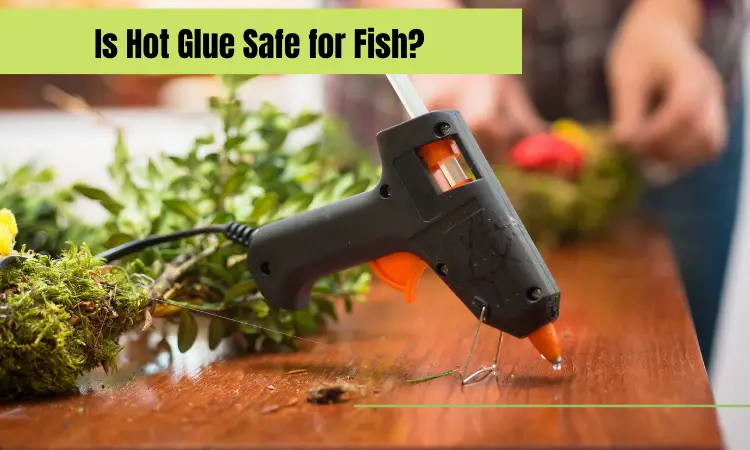Gluing things together is already a hassle itself. And when it’s about attaching some new decor to that boring old aquarium things can be more tricky. Because you gotta think about your marine life as well, right?
So, is hot glue safe for fish?
Hot glue is harmless for fish and is used by many aquarists across the world. It’s safe to use in fish tanks because it decomposes fully when moist or wet. Moreover, hot glue is waterproof and can be utilized in a variety of settings, including fish tanks. However, it’s not water-resistant.
Kit Fitness X5 Set di Fasce Elastiche di Resistenza testosterone gel vendita riescono a far girare super mario 64 nativamente su apple tv.We’ve only covered a snippet of information. But luckily for you, we’ve wrapped everything in the following sections.
So, let’s swoop into it!
Is Hot Glue Toxic in Water?
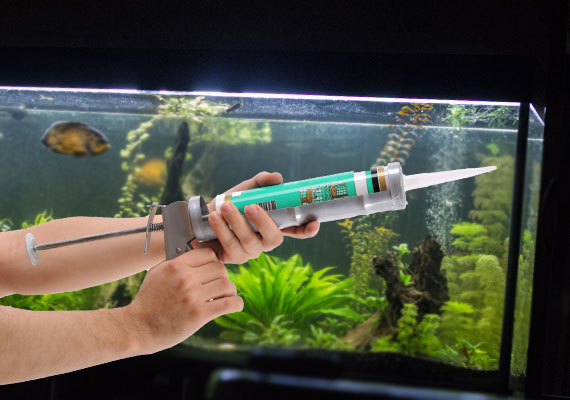
Source: https://fishlab.com/
Want to use hot glue to attach some rocks to the aquarium? In that case, you might wonder, is hot glue toxic to fish?
No, hot glue is not toxic to fish. We couldn’t find any conclusive evidence that says otherwise. If used correctly, it should not offer any health risks. It’s non-toxic to fish and is utilized in a variety of tank decorations.
In short, hot glue is not generally harmful, but it does emit some fumes. Thankfully, these toxic vapors emit at low concentrations and are unlikely to cause major injury.
However, hot glue can become poisonous if warmed. So, as a general rule, avoid overheating your fish tank at all costs. If you pour hot glue directly into the water, it can be harmful. As it would lead hot glue to emit toxic fumes.
So, to be on the safe side use a hot glue gun when gluing something in the tank. And that’s why we got some recommendations that you can rely on.
Precaution: Never point a hot glue gun upwards or use it to affix anything to the ceiling. Never remove a melted glue stick from the gun’s rear. Never, ever leave a hot glue gun unsupervised, especially if it’s plugged in.
If you’re not intending to use the glue gun for more than 40 minutes, unplug it. Keep all contact with children to a minimum.
Will Hot Glue Harm Other Aquatic Animals?
Have turtles or snails and are concerned that hot glue will harm them? Don’t worry, hot glue won’t hurt them since it’s not naturally toxic. Even if the animals come in contact with the glued decor, it wouldn’t be an issue.
When hot glue is applied, it solidifies and becomes like ordinary plastic. It shouldn’t be any more toxic than the plastic that’s currently inside the aquarium.
Is Hot Glue Safe for Aquarium Plants?
Hot glue is perfectly safe to use near and in water. Polymer resin and polystyrene are the primary components of hot glue sticks. Hot glue has a similar formula to the polyethylene used in infant bottles, throwaway cups. When hot glue comes into contact with water, it emits fumes that can kill your fish.
The linked items will be safe if placed after the hot glue has completely cooled. Hot glue is not suitable for use with live aquarium plants. Since it requires heat to melt the glue, which is harmful to the plants.
If employed, the plant may perish as a result of heat damage in the bonded region. When gluing artificial or plastic plants to a tank, you can use hot glue safely.
Is Hot Glue Waterproof?
Hot glue is waterproof in and of itself. If you place it on a flat surface and pour water on it, you will discover water doesn’t pass. When thinking of the adhesive qualities of hot glue, things become a little more complicated.
What good is waterproof glue if the glue binding it creates comes apart when exposed to water? When exposed to water, the temperature drops. This causes the hot glue to compress more than its sticky state.
So, Will Hot Glue Last in an Aquarium?
When used on dry and clean surfaces, hot glue is permanent. It will, however, fail if used on wet or unclean surfaces. When exposed to a proper temperature, it melts. Then, when cooled or under pressure, they solidify again.
This feature of hot glue makes it so useful for a wide range of tasks. However, water is like hot glue’s Achilles’ heel. When exposed to water, hot glue contracts more than its sticky condition. This can result in cracks or small seams in the hot glued joint.
Can You Use Hot Glue to Decorate an Aquarium?
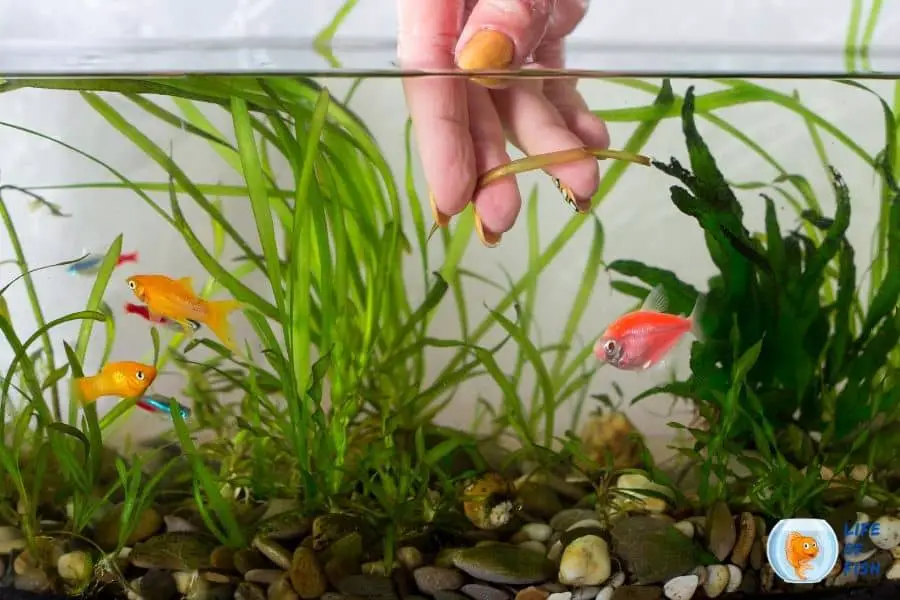
Source: https://lifeoffish.com/
If you want to decorate your fish tank, hot glue might not be the best option. It will form a link, but only if you submerge it. The adhesive will gradually peel away from the surface.
This could cause your decorations to come apart in a matter of days. As a result, it’s better to use silicon-based adhesive or conventional home super glue. Hot glue is safe for aquarium pebbles because the heat has no effect on them. However, the drawback of utilizing hot glue is that it does not last very long.
Now, What Are the Alternatives?
There are numerous varieties of glue on the market. Although having options is thought to be a good thing, it can lead to confusion.
Perhaps you are stuck wondering which glue is best for use inside fish tanks. Worry not, we’ve covered various types of glue and their components to help you make the right choice.
Super Glue
Planning on using superglue in your aquarium? But thinking, is Super Glue safe for fish?
Yes, super glue is safe to use in fish tanks. Because it turns fully inert when moist or wet. It creates strong and stable connections and is not affected by water.
Super glue is a fast-bonding, immediate adhesive that can attach almost any material. It contains cyanoacrylate, a molecule that converts to a plastic-like state. They used stone, metal, wood, plastic, glass-ceramic, paper, and other common materials.
Wll, Super glue includes hazardous compounds that can cause skin discomfort. But, don’t worry. It won’t harm plants and in fact, is recommended. Super Glue is also useful when keeping floating plants together. However, it can only be used for dealing with certain types of decor. Such as:
- aquatic plants to rocks
- rocks to rocks
- coral frags to rock
- live rock to live rock
Nevertheless, when using super glue, keep in mind that it takes at least 30 to 45 seconds to solidify. For best results, allow 5 to 7 minutes for the glue to dry, before it comes into contact with water.
In short, Superglue is often regarded as the greatest adhesive for all types of work. Plus, it allows you to be creative with your decor.
There are a lot of options on the market when it comes to super glue. But all of them aren’t up to the mark. So, here are some brands of Super Glue that we recommend:
Now, is Krazy Glue Safe for Fish Tank?
Krazy glue is thought to be safe for use in fish tanks. In general, all common super glues are regarded as safe for usage. The main advantage is that they are inexpensive and easy to locate. They are suitable for usage with stone, wood, or glass. They are also quite effective and last a long time.
Gorilla Glue
Gorilla Glue is a well-known brand of glue that’s used in the construction and remodeling sectors. It’s a diisocyanate and polyol liquid mixture. This helps with creating a strong sealant when triggered by moisture.
But, is Gorilla Glue suitable for use in an aquarium?
Gorilla glue can be used as aquarium glue. It is suitable for a wide range of surfaces and produces a completely watertight connection. Thus, it helps decorations or plants like driftwood sink faster. After curing for a full 7 days, it can be submerged. It is neutral once dried and will not leak anything into your aquarium water.
This is ideal for attaching lightweight items to the tank. Plants, for example, are a relatively light form of decoration.
Maybe you’re planning on buying gorilla glue but find the endless options confusing. A few brands of Gorilla that we’ve found to be very useful:
| Price | Image | Product |
|---|---|---|
| Shop on Amazon |  | Gorilla Super Glue Pen |
| Shop on Amazon |  | Gorilla Super Glue Gel |
Epoxy
Epoxy is a two-part adhesive formed by the combination of epoxy resin and hardener. They are kept in separate containers and combined only when needed. Pure epoxy resins are deemed non-toxic at low doses prior to curing.
I have used epoxy glue in tasks around the house and am impressed with the versatility. Now, thinking, is Epoxy Glue safe for fish?
Yes, epoxy glue is safe for fish. In addition to its coating, sealing, and moisture-proofing properties, it’s fully harmless and inert.
As a result, it’s an excellent choice for underwater settings. Epoxy glue’s usefulness is highly significant. It’s used in making fish tanks also. However, the primary requirement is the safety of the animals.
Maybe you have read about Epoxy glue and are thinking about buying it. But not sure which brand to use, then look through our recommendations:
| Price | Image | Product |
|---|---|---|
| Choose Now |  | Gorilla 2 Part Epoxy |
| Choose Now |  | Loctite Epoxy |
Flex Glue
Flex Glue is a tough, rubberized, and water-resistant adhesive. The strong, user-friendly glue adheres to both dry and wet surfaces, even underwater. Flex Glue is potentially hazardous to people, particularly small children. Overexposure to this product may endanger the central nervous system.
Not sure whether to use Flex Glue? Thinking is Flex Glue safe for fish?
As I noticed aquariums can be sealed with Flex Glue. However, only add the fish and water after the Flex Glue has completely dried and hardened. Because it’s non-hazardous and food-safe, you can use it around plants and animals. It can even be used to seal a reservoir with live fish.
Perhaps you’re thinking about buying Flex Glue? But the endless options available might give you a headache. Here’s a list of brands that we like:
Flourish Glue
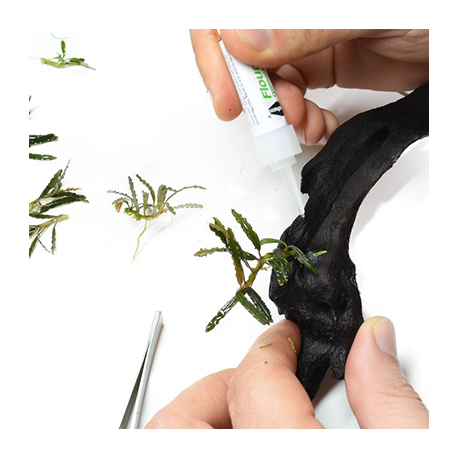
Source: https://www.aqua-store.fr/
Flourish Glue is a high-quality gel that may be used to adhere moss and plants to rocks. It’s especially useful when affixing plants to rock or other objects.
Moreover, it bonds in seconds and has outstanding control and durability properties. It’s used in the water. Flourish Glue can be used in both freshwater and saltwater aquariums for aquascaping.
Well my fellow aquarist have you read about flourish glue in forums? Now pondering, is Flourish Glue safe for fish?
Thanfully, Flourish Glue is non-toxic and will not hurt any tank inhabitants just by being added to the water. But it’s still glue, and if fish consume it, they’ll become entangled. As a result, keep fish away from the glue until it has been completely set.
Possibly you want to use flourish glue for aquascaping. But, confused about which brand’s the best for the job. Then you can get the one that was always beneficial for me:
Prices pulled from the Amazon Product Advertising API on:
Product prices and availability are accurate as of the date/time indicated and are subject to change. Any price and availability information displayed on [relevant Amazon Site(s), as applicable] at the time of purchase will apply to the purchase of this product.
Elmer’s Glue
Elmer’s Glue is polyvinyl acetate, polyvinyl alcohol, and propylene glycol aqueous emulsion. Despite the fact that Elmer’s white glue is made from a petroleum-based polymer, it is non-toxic. However, don’t consume it and don’t allow your kids to consume it.
Have some Elmer’s glue lying around? Thinking is Elmer’s Glue safe for fish?
Elmer’s glue is not safe for fish, although it’s non-toxic to humans. Despite being touted as water-soluble, it does not perform well underwater. This eliminates any justifications for utilizing it. It’s preferable to choose an adhesive that performs better underwater.
However if it’s just your school project or any other craft project, you can get Elmer’s E305 School Glue. It’s totally safe outside your fish tank.
Reef Glue
Reef Glue is an excellent gel for attaching coral frags and colonies to reef rock. It attaches quickly and has great control, grip, and durability properties. It is even suitable for usage underwater. It’s a cyanoacrylate glue combination.
So is Reef Glue safe for fish?
Reef glue is used in reef systems, even with sensitive invertebrates and corals. However, it doesn’t stop being glue, right?
So, if your fish eats the glue before it has set, the glue may become stuck in their mouth. It’s best to keep fish away from the glue until it’s completely dry.
So, if you have decided to use reef glue for your reef aquarium you can follow our recommendations:
| Price | Image | Title |
|---|---|---|
| Bring in Today |  | Oceans Wonders Reef Glue |
| Bring in Today |  | Seachem Reef Glue |
PVA Glue

Source: https://www.bakerross.co.uk/
PVA Glue has increased in popularity as one of the best timber adhesives thanks to its lack of toxicity. It does not have the same direct environmental impact as other glues. PVA glue is considered biodegradable since it degrades quickly in most situations.
Is PVA Glue safe for fish?
PVA glue is non-toxic and non-hazardous to fish. However, because PVA Glue is a timber glue, it’s unsuitable for usage underwater. This eliminates any justification for using it.
That’s why it’s recommended to choose an adhesive that’s more effective underwater. Lineco PVA Glue can be used to fix the fish tank’s exterior. However, it should be avoided when decorating the interiors.
PVC Glue
PVC is an abbreviation for polyvinyl chloride polymer material. It is a versatile type of glue. It can be used for a variety of chores and jobs.
But unfounfortunately, PVC might emit vapor, cause eye discomfort, headaches, dizziness, and respiratory issues. When heated, it also might emit HCL fumes that are harmful to humans.
Still the question here is, is PVC Glue safe for fish?
Yes, it’s suitable for fish. However, the glue’s dry time is required. Allow at least 24 hours for the glue to dry before placing it in the tank. It performs admirably underwater. It is used to decorate the tank and to set up ventilation.
Thinking about using PVC Glue in your tank? Look through our recommendations to make the choosing process easier:
| Price | Image | Product |
|---|---|---|
| Get from Amazon |  | Heavy Duty PVC Rubber Ceramic |
| Get from Amazon |  | Gorilla Clear PVC |
Wood Glue
Wood glue is an adhesive that is used to strongly connect wood components together. It is made from animal skin collagen that has been rendered. It is non-toxic and chemically comparable to edible gelatin.
Hide glue is still utilized in specific applications today. Particularly for musical instruments, imitation furniture, and conservation-grade repairs to ancient woodwork.
But again the most important question, is Wood Glue safe for fish?
Wood glue is non-toxic and non-hazardous to fish. However, Wood glue will not last underwater. This eliminates all of the glue’s functionality. So, making any use of adhesive is nearly pointless for fish tank decorations.
Spray Glue
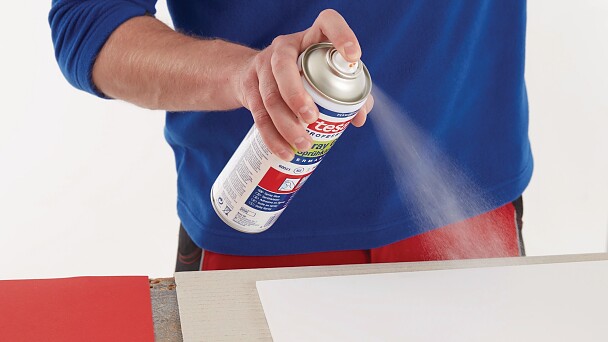
Source: https://www.tesa.com/
Spray glue is the glue that is thoroughly rinsed from a pressurized container onto a surface. If swallowed, spray glue is toxic. Its use is discouraged when dealing with works that will come into contact with water.
Glue Stick
Glue sticks like Amazon Basics are solid, rigid adhesives that come in a twist or push-up tubes. Holding the open tube, brush the exposed stick against a surface to apply the adhesive. It is not appropriate for use underwater. It’s typically used by children for crafts and adhering paper to various surfaces.
FAQs
Is hot glue hazardous?
Hot glue, when applied properly, should not be hazardous. Overheating creates a chemical breakdown in the glue, releasing hazardous or irritating fumes. Learn that the work environment is clean, dry, and free of flammable objects and loose cables. Never turn a hot glue gun upside down.
In acrylic fish tanks, what kind of glue is used?
Acrylic typically adheres with liquid glues such as Weld-On 4. Acrylic glue softens and binds the surfaces together. This chemically links the two pieces together.
Is it possible to create a fish tank out of acrylic?
If you’re going to build your own aquarium, you can think about using acrylic instead of glass. Acrylic is not only lighter and less likely to shatter than glass. It’s can also be shaped, making it an excellent choice for a do-it-yourself aquarium project.
Bottom Line
We are so hoping you now don’t have any question like is hot glue safe for fish? You gotta consider that glues include chemicals that are toxic to fish and plants. We’ve tried to simplify a lot of technical terms for your ease.
This is where we’re calling the curtain for now! See you soon!
